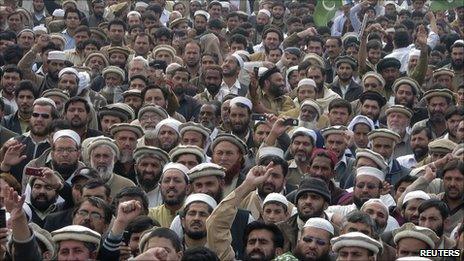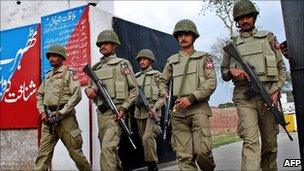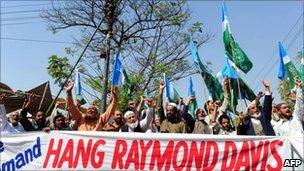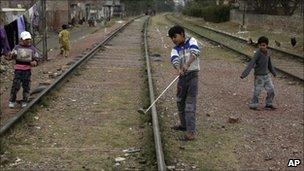Extremists exploit Pakistan's political paralysis
- Published

Those leading Pakistan's street protests are opposed to democracy
Islamic fundamentalists and extremist groups in Pakistan are on the march as they take advantage of a government and army that appear paralysed or in retreat in the face of growing militant demands. Guest columnist Ahmed Rashid reports from Lahore.
Major cities in Pakistan have experienced non-stop demonstrations by the hardliners since the killing of Punjab Governor Salman Taseer last month. The protesters include mainstream Islamic political parties, Sunni and Shia sectarian groups, Deobandis and Barelvis.
Some of these groups are usually at loggerheads - Deobandis and Barelvis for example both belong to a Sunni sect.
Others are extremist groups who have been banned by the government but are re-emerging in the open from all sides.
The hardliners have united over three issues: no reform of controversial blasphemy laws, the government's alleged pro-US policy and the ever-worsening economic crisis. All are reflections of the enormous traumas being confronted by Pakistani society.
Intelligence scrutiny
Unlike previous campaigns the 30-odd Islamic parties and groups now make no bones about the fact that they want to topple the government.

Analysts say that the army is happy to see US discomfort over the Raymond Davis issue
Posters have been popping up in all major cities demanding an Islamic state.
Extremist groups such as Lashkar-e-Taiba (LeT) are at the forefront of the campaign and have been around for some time - undergoing many name changes.
Despite being banned by the government and declared a terrorist group with links to al-Qaeda by the US and Britain - LeT has played a prominent role in marches in Punjab province - even receiving help in staging them from the provincial government led by Shabaz Sharif.
While some extremist groups have held rallies in government-owned buildings, LeT leaders have openly led their rallies despite being wanted by India for allegedly organising the Mumbai (Bombay) attacks of two years ago which left 174 people - including nine gunmen - dead.
LeT leaders - who deny having anything to do with the attack - are normally under intense intelligence scrutiny, but now that is either no longer the case or no longer worries them.
On the most contentious issue - amending the law on blasphemy - the government has bent over backwards to appease the hardliners saying that it has no intention of changing the law.
Meltdown
Prime Minister Yousuf Raza Gilani has literally begged the mullahs to accept his assurances, but as new alleged cases of blasphemy emerge, the hardliners insist on continuing their campaign.

The government has dithered over key issues, allowing extremists to fill the void
The sensitivities around this issue were clearly seen earlier this month, when a 17-year-old Muslim college student in Karachi was arrested for allegedly committing blasphemy by writing something irreligious in his school exam paper.
Fear of the hardliners has also prevented the government from releasing Ray Davis, a US man who shot and killed two men alleged to be thieves who reportedly tried to hold him up in Lahore.
Mr Davis is currently in police custody. The US says he has diplomatic immunity and must be freed immediately.
While the authorities have procrastinated, Washington said it would halt all bilateral meetings with Islamabad until their demands are met.
The Pakistani government has dithered over the issue - it has come under withering media and public criticism for its mixed messages and lack of decision making over the issue.
The foreign ministry in particular has been accused of incompetence in failing to define the status of Mr Davis.
Neither has the army prodded the government to free him - many analysts believe it is quite happy to see American discomfort over this issue continue for a little longer, even though billions of dollars of US economic and military aid are at stake.
With the International Monetary Fund refusing to continue its loan programme to Pakistan unless the government raises more taxes, the economy is in a state of meltdown.
Economic mess
Inflation is rising every day, the rupee is being devalued and the State Bank has had to print hundreds of millions of bank notes every week to keep the government afloat.

The danger for children is that Pakistan is becoming more and more polarised
The hardliners have made the economy an effective rallying cry while at the same time accusing the political and feudal elite of massive corruption.
The economic mess caused in part by the government's lack of decisiveness affects everyone but it is the hardliners who are making it into an issue of rich versus poor, the Islamic way versus dependency on the West.
In fact all political parties - including those in the ruling coalition and the opposition - seem to be appeasing the fundamentalists rather than standing up to them.
The government is showing neither leadership nor decisiveness on key issues that need to be addressed.
Officials for example admit that according to international law Mr Davis will have to be released, but the longer the government delays doing so, the more trouble it is storing up for itself when it finally does so, because the extremist reaction will be even fiercer.
On the economy the government is likewise unwilling to tax the rich or the landlords who constitute the majority of Pakistan People's Party (PPP) MPs.
Pakistani society is also having to cope with unending violence in the country caused by extremism, ethnic and tribal hatreds and a social polarisation that is getting worse by the day.
What could happen in Pakistan is being likened to what has happened in Egypt.
But the difference is that while the Egyptian people stood up for greater democracy, many of those who lead street protests in Pakistan are extremist radicals opposed to democracy.
The government needs to be firmer, get a better grip on affairs and take the necessary hard decisions before the country slides further into chaos.
Ahmed Rashid's book, Taliban, was updated and reissued recently on the 10th anniversary of its publication. His latest book is Descent into Chaos - The US and the Disaster in Pakistan, Afghanistan and Central Asia.